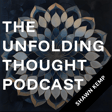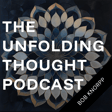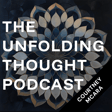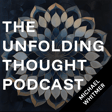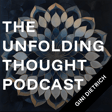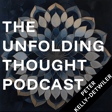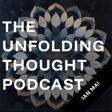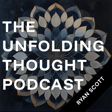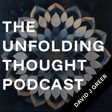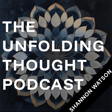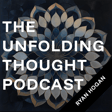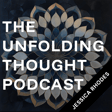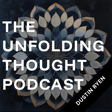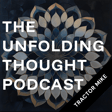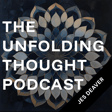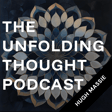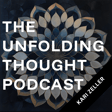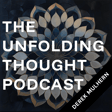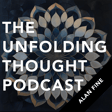Introduction to the Unfolding Thought Podcast
00:00:03
Speaker
Hi, I'm Eric Pratham. Welcome to the Unfolding Thought Podcast, the show for leaders and deep thinkers who demand more than the usual fluff. If you're the kind of person who moves on from a book, video, or podcast, the moment it stops making you think or introducing you to something you can use, I hope you'll feel right at home here.
00:00:25
Speaker
In each episode, we uncover the deeper, often overlooked forces that shape our thoughts and behaviors so you can see yourself, your team, and the world from a whole new angle and then actually apply what you learn to grow and do better.
00:00:42
Speaker
On the Unfolding Thought podcast, we aim for minimal filler and maximum insight, challenging assumptions and sparking new thinking every step of the way. Are you ready to dive deeper?
00:00:55
Speaker
Then let's get started.
Meet Mandy Hoskinson, Founder of Zolay
00:00:57
Speaker
Have you ever found yourself right in the middle of a real public emergency, having to take action immediately to ensure it does not impact even more people?
00:01:08
Speaker
Or how about dealing with an online firestorm all started because of a lie? Today, I'm speaking with Mandy Hoskinson, founder of digital marketing agency Zolay, president of Social Media Club Los Angeles, and vice president of Social Media Club Global.
00:01:26
Speaker
Not only has she dealt with tense and difficult situations like these, but also she's had a major influence on building brands and movements that have major economic and other impacts on communities such as helping to land the Los Angeles 2028 Olympics.
00:01:45
Speaker
Mandy and I talk not just about her work, but also her philosophy on an approach to social media, digital marketing, and effective communications generally.
00:01:57
Speaker
Listening back on this conversation, I'm struck by how much value is packed into a conversation with Mandy, and I hope you will be too. And now, I bring you Mandy Hoskinson.
00:02:09
Speaker
Mandy, thank you for joining me. Would you mind telling me a little bit about your background? Sure.
Mandy's Career Journey: From Military Kid to Marketing
00:02:15
Speaker
i am a military kid who settled in Los Angeles about 15 years ago.
00:02:21
Speaker
Went to UCLA, got into marketing. i My first kind of brand that I worked on was actually UCLA. I was with one of their first UCLA social media hires.
00:02:32
Speaker
Got to work on that brand. From there, I got to work with the bid to win the Olympics for Los Angeles, which we won. Box, Went back to UCLA, worked at CBS, and then started my own agency about seven years ago.
00:02:45
Speaker
When you went to work for UCLA, or I suppose, let let me back up. What did you study when you were in college? Yeah, I studied world arts and cultures, which is a very funny almost hidden department at UCLA. It's, I kind of call it an art and anthropology degree.
00:03:03
Speaker
So it's a subset of the dance degree, which is bonkers. But i actually started as a music major. That's a long story, but i I knew I wanted to do something like international development.
Academic Shift to World Arts and Cultures
00:03:17
Speaker
Went to that degree and I was studying Swahili because i was really interested in like HIV AIDS work. Worked in Tanzania for a summer, came back and asked the department if I could use my work in Tanzania as my study, of my mandatory study of abroad credit. And they did not let me do it.
00:03:34
Speaker
They said I had to go to Paris or Shanghai. And I said, but I'm studying Swahili. And they said, it doesn't matter. And so i found a major that worked with the work that I wanted to do, which was global health.
00:03:49
Speaker
And through that is kind of ah I found that a good place for me was actually communicating about the global health organizations that I was involved with.
Early Social Media Roles at UCLA
00:03:57
Speaker
And that sort of led to my communications career.
00:03:59
Speaker
Okay, so then when you went to, think it was work for UCLA, you already had some interest in or some experience with communications, I guess. And how did you come upon this role or get into this role at UCLA? Yeah.
00:04:18
Speaker
Yeah. Yeah, it's funny. So when I was getting into social, it didn't wasn't quite called social media yet. It was, it wasn't, right? And I had had web assistant jobs on campus. So I'd had a web assistant job for housing, and that was a mixture of photography, videography, photography.
00:04:37
Speaker
And, and Facebook and the web website, like just kind of that like web media role. And even before that, in high school, I had volunteered for an environmental festival, and they needed more volunteers and more attendees. And I pitched putting it on Facebook.com.
00:04:54
Speaker
was like, what if we put it on this place? Like, it's cool. They had they just launched this events feature. And they were like, okay, kid, like, whatever, that's your job. You asked for it. And so I did. And it was like one of our strongest years yet.
00:05:06
Speaker
And that's that had given me the inkling all the way years prior that that I was sort of onto something. i got the web assistant job. but i found another nonprofit on campus that was doing really cool work. I asked them if they had thought about putting their stuff on Facebook. And they said, ah we have thought about it. ah She actually said, are you an angel that dropped from heaven? and I said,
00:05:29
Speaker
And so I landed that internship I invented for myself. And so by the time this other web assistant job showed up, I already had work experience. And I actually just spoke at a panel for UCLA students last night.
00:05:42
Speaker
And one of the things that came up then was even if you don't have a ton of work experience, having an opinion, i think, really matters. And I came in with an opinion. i really liked what UCLA was doing on Foursquare. Remember Foursquare?
00:05:56
Speaker
oh yeah. And so I said like, oh, yeah I've been following what UCLA is doing on Foursquare and Tumblr. And, you know, i at the time, that was like a pretty, pretty surprising, like involved thing to be doing because this was their first ever team. They really hadn't invested a lot into it yet. So, yeah, I had a bit of that work experience prior.
00:06:19
Speaker
Okay, thank you. And, you know, I'm filling in the gaps for myself a little bit here, but it sounds like your experience getting into a career in marketing was somewhat similar to mine in that you had an interest in ah certain space, channels, however it is that we want to characterize it, and...
Entrepreneurial Journey in Marketing
00:06:47
Speaker
then you were lucky enough to talk to the right people or have the right opportunities, but that you had also, in addition to some interest or some curiosity, you had a little bit of an entrepreneurial drive,
00:07:03
Speaker
in that you were likely going to go into these channels or these spaces and try things out. And you were kind of lucky enough to be able to do that as part of your career or the beginning of your career, if I'm hearing you correctly.
00:07:18
Speaker
Totally. Yeah, totally. I think, ah yeah, I think anybody who does any sort of tech futurism, marketing futurism work is a little entrepreneurial. They're a little risk taking. And then there is an immense amount of luck in every step of that journey. Yeah, there's so much behind it of, yes, like of being being in the right place at the right time, but then also,
00:07:45
Speaker
having the interest and having pursued things to a certain degree before that opportunity popped up. So you did have some jobs you were working for other people and in some cases within I think some fairly large organizations whether it was UCLA, I think you said Fox at one point.
00:08:07
Speaker
But you did go out and start your own business. I'm guessing at least early on you were a one person shop and you've grown from there. About how long have you been running your own business?
Transition from CBS to Entrepreneurship
00:08:23
Speaker
Yeah, we started in 2018. And really, i was leaving CBS. I was um social media for primetime dramas. had 12 show assignments and then also was on the CBS All Access team, now Paramount Plus. And I was on the CBS main brand team. So by the time I left, I had 19 assignments, which is a lot of accounts to run.
00:08:44
Speaker
And yeah, I i definitely wanted a social media break. And I loved photography. And so I sort of leaned into the photo side of my work. while also keeping websites and social as an available service. I had been freelancing. I think that i think this is the story of so many agency owners is that you get your people keep knocking on your door enough that you just end up starting your own thing.
00:09:07
Speaker
there's that There's a lot. There's more to that story, but it was the right time to leave CBS. It is like a very famous time when a lot of women left CBS. And I'll leave it at that. And started my own company.
00:09:18
Speaker
I started small. Photography did really well. And so... I, you know, I had found that I didn't love working at home all the time, something that people would soon discover themselves, and that I would really like an office.
00:09:31
Speaker
And I was doing photo shoots in my living room and and like kicking my husband out so I could do them. And I live in a one bedroom apartment
Impact of COVID-19 on New Business
00:09:38
Speaker
in LA. So that's like not a very convenient thing. and So i I worked at people's homes and I worked at other people's offices and kept an eye out for an office for myself and opened our official studio March 2020, a terrible, terrible time to sign a lease and open an office space.
00:09:58
Speaker
And yeah, and then struggled in 2020. But, you know, I'm very involved in the social media community. As you know, it's how we know each other. And I've also just done social for a long time. And so luckily, people that needed social media help sort of came up. And so now 95% of our company, which has 12-ish team members, I would say, like, it's more like the equivalent of four full-timers. But that's the way social media works. People consult in, like, very niche services. So we have lots of service providers.
00:10:31
Speaker
Yeah. so now that's about 95% of our income and and photography is maybe five. So if things have pivoted a bit. So the 95% you said is social media, right? Okay. Yeah.
00:10:44
Speaker
And maybe at this point. Yeah. Yeah. Okay. Yeah, actually, I'm glad that you mentioned that. Back in the earlier days of social media, you know, Facebook.com or pick whatever channel you want to pick.
00:10:59
Speaker
They were largely standalone. You know, you kind of had to go to that place in order to engage with your friends or whoever was there, the content that was there or the actions that you could take.
00:11:16
Speaker
Now, you know, especially over the last, let's say, 10 years or so, you've had a lot more e-commerce and advertising developed in the social media
Integrating Social Media with Analytics and E-commerce
00:11:29
Speaker
space. so So with the social media work that you do or the clients that you work with, do you end up tying the frequently to analytics and tracking or advertising or e-commerce or any other things that maybe aren't quote unquote social media, but they're important to the businesses or the organizations you're working with.
00:11:54
Speaker
Yeah, definitely. i think especially ah for folks like us who got in before when that was just sort of an ancillary part of Internet work, they weren't they weren't separate.
00:12:08
Speaker
And so i have come in with a holistic perspective because of when I started in this work, I think also just the way that I think in general, I always came in from an organizational perspective because that's sort of where I started.
00:12:25
Speaker
and then now, as someone who just really likes to provide high level strategic work, I have have had the practice of being embedded in other parts of these organizations and operations.
00:12:39
Speaker
But I also think it's an incredibly important. I think one of the nerdier examples, but the thing that's really relevant this month is CRMs, customer relationship management, right? The first time that i really got embedded in a CRM was when UCLA recruited me to come back.
00:12:57
Speaker
So I had been at the UCLA brand. And during that time, these cool guys were starting the first university crowdfunding platform. And UCLA was one of the first test universities to have its own platform. And so i had crossed paths with the person that had sort of taken up charge of that role and given him brand advice and and templates and things like that about how to do marketing as UCLA organization.
00:13:27
Speaker
And so when my Olympics work wrapped up, a job opened and I went back to work with him with crowdfunding. And we sat in the corporate foundation and research relations office, which just like social media, like these sort of new technologies, they had to sit somewhere like someone has to put the money down.
00:13:47
Speaker
And it's always fun to hear about what how someone's role is different because of where their position is born or where the funding is come coming from. So we had to be there bright and early in California time anyway, like like full professional clothing because these were people that were getting $50,000 checks, checks, million dollar checks. Like that was their job. My job was to get $1 checks and to help students get them from other students and from alumni.
00:14:20
Speaker
But I was really embedded in their fundraising technology, in their CRM. And I got to see how high level fundraising happened because that was the office that we were in. And we had to like, the way that this office had data,
00:14:35
Speaker
and And performance metrics was CRM work. And so I was also part of a program that helped people track donors on social media because I was catching their donors talking smack about departments that they gave to online. And I would tell their fundraiser like, hey, I saw your donor say something online. Do you follow them on Twitter? Like, have you looked at what they have to say?
00:15:01
Speaker
And so I helped people. sort of these high-level fundraisers find access to social social media tracking and analytics for their donors. And then on the other end, started to incorporate these like very small-level donations that hadn't really been tracked into a software.
00:15:18
Speaker
So from that experience, I have done some sort of CRM um work for pretty much every single brand I work with, even if it's just me doing it myself. And every time i do it, a year later, somebody says, do you have data on X?
00:15:33
Speaker
And I go, yes, because I had built it in. It might seem like a strange example, but like like the sort of like data tracking um analytics, I think is a good example of a connection of like the bigger picture rather than just tweeting, because we're doing so much more than that. And if you know what the organizational goal is and how they track their own progress,
00:15:56
Speaker
social media can go so much further. And that's the sort of holistic consulting that we provide our clients. It's such a hard story to tell. It's like, hey, we actually know the bigger picture of, to your point, ads, analytics, e-commerce, CRM, organizational management, like volunteer management. Like we we bring a bigger picture understanding.
00:16:20
Speaker
But, you know, proving that in web copy is is hard, but it is what we're but what we're doing. I have two CRM meetings after this this call today. So it's what we're doing real time.
00:16:30
Speaker
Well, in my career, when got heavily involved with CRM level data, that was when I was working primarily with nonprofits in fundraising.
00:16:44
Speaker
And I had gone from... more broadcast-like marketing, you know, awareness level stuff, and then also just social listening type data in social media.
00:16:58
Speaker
And then to see, you know, no, we're really looking at an individual or a pool of people, and we're looking at average lifetime value anything.
00:17:11
Speaker
How many direct mail pieces or emails or whatever it is do we have to send in order to get a certain return? And then cross-channel as well.
00:17:22
Speaker
I'm sure over time you have been involved in things like your clients are hitting people in some non-social media channel and then you are activating either the owned social media or perhaps I don't know if you get involved in social media advertising but you know then there are questions of like well what's the return if we hit a household or an individual with two channels versus one and so when I got exposed to CRM level data
00:18:00
Speaker
then i felt like it was just so much easier to put together a hypothesis and then measure whether or not our hypothesis played out in the real world.
00:18:14
Speaker
hundred percent 100%. Yeah. Yeah. um We do advertising. i have an ideal cap where we'll cap out and we we'll just work with another company. Generally over 10,000 a month. we there's There's different ways that we sort of manage that. But yeah, 100%. Getting that data, actually thinking it through, having good databases, good reporting, it makes a big difference.
00:18:37
Speaker
And it's what you would hope from a social media perspective. and team and social media analytics, I don't, people don't always know how to shop, especially like as a vendor.
00:18:48
Speaker
There are some people who know absolutely a lot and we have an easier time being able to share our value because as you know, you someone understands what we're doing, like that we're doing that, right? That we have CRM level data about people that we know that we've reached them in multiple ways.
00:19:06
Speaker
Their work is going so much further, but all they hear is a number sometimes. And it's ah it's a journey to sort of communicate that value if they don't have the sort of working knowledge of what in-depth works looks like versus just getting a post up or getting an ad out, you know?
00:19:26
Speaker
Yeah, you, well, let me go back a little bit, just real quick. So you mentioned that we know each other because of social media. You and I met each other because of Social Media Club.
00:19:40
Speaker
Now, so are there certain things that you're focused on at the moment or what's going on, I suppose, with Social Media Club, at least as of today?
Social Media Club: Learning and Networking
00:19:52
Speaker
So the Spiel is Social Media Club is a 19-year-old going on 20-year-old nonprofit learning and networking organization that has had in the past 100 chapters around the world.
00:20:05
Speaker
And... I joined about 12 years ago, i think 13 now in L.A. And L.A. was a ah pretty big community here, too, where there would be learning and happy hours workshops.
00:20:19
Speaker
And yeah, the there's a lot of things have changed with professional organizations. over time. And i think, yeah, i think people's relationships to them has changed. I frankly, from a global perspective, I'm still getting involved. But my role with Social Media Club Global is that I'm the VP of operations globally, and I'm the chapter president in l LA.
00:20:41
Speaker
You know, when you are trying to breathe life back into a community or, you know, a city that you're involved with doesn't have the momentum or or, you know, something like in Atlanta who's getting restarted is trying to sort of revive momentum.
00:20:58
Speaker
I have tried to look to the organization's heart and where it started. And the mission holds up. The mission that's on the site, I guess, is like 10, 15 years old And I sat down with the executive director and we wanted to change like a single word, ah which is pretty cool. But it's basically we get a bunch of people together to learn about this new technology, use it ethically and support each other working with it.
00:21:27
Speaker
And when i looked at it, I realized it's actually a marketing futurism organization. And it took me a while to sort of put that together because Social Media Club was founded the year Twitter was founded and started when we were texting to tweet.
00:21:41
Speaker
And i was kind of trying to put together and and, you know, maybe in my future, there's a world of me meeting some of the ah original founders and and sort of their heart of things.
00:21:52
Speaker
But when I was going to social media club events is when there weren't social media managers yet. And it's kind of like AI. I always say if if social media club were to start in the past couple of years, it would be AI club.
00:22:04
Speaker
Because it's really this, at the time, 19 years ago, social media was this like magical, futuristic vertical in technology, in communications. And so the members in l LA that are longtime members, they're PR people, they're video people, they're journalists, they're photographers, they're actors. Like it was anybody interested in the future of this technology.
00:22:30
Speaker
and So as I recruit new members who are just coming in and they like, you know, especially our younger members are just coming in thinking about influencers. I'm trying to pair the people that have been in it for a long time who are, ah mark you know, tech futurists, in my opinion. And then there's this whole other world of sort of celebrity.
00:22:53
Speaker
That's like a newer part of marketing. And do we honor the heart of the early learners who are there to learn about sort of like tech and communications and or these newer folks that are, you know, connecting in a different way and like building audiences in a different way?
00:23:12
Speaker
And the answer is we want to honor everyone and we want to localize. Like we want to for all the each chapter president that I mentor, i'm all i always just encourage, A, pursuing what you you're interested in and what's in your network, because that's, of course, what you're going naturally do.
00:23:28
Speaker
And B, to provide what your city wants or needs. But I'm a tech nerd. So I always lean that way and I get pushback from my board. of we should be focusing on social media and everything that it entails.
00:23:44
Speaker
So what I'm up to right now is really just trying to empower cities with the tools that have worked for me and hopefully bonding between cities, which is absolutely happening about what is working for them in their city.
00:24:00
Speaker
as we navigate the future of social media, which is now a massive industry, um but because it doesn't have the but charm, the flash like AI does, it's now we're now just another established industry We're just another established industry, right? it's It's the Public Relations Society. It's the American Marketing Association. Like now we're just social media club. We don't have that sparkle that AI kind of has for events right now. So I'm helping the organization on a global level figure out what it means to honor our earliest members and to venture into a new world.
00:24:37
Speaker
And the last thing I'll say is that my core thesis is that we build careers. That's like, that's where I come from is people, people join the board because they're building.
00:24:48
Speaker
People come to our events because they're building or pivoting. Be it if they come to happy hours to network, if they come to panels to learn, if they speak on panels to grow their thought leadership, the people that feel settled and happy with where they are.
00:25:03
Speaker
often aren't there. They're doing something, they're building, they're they're connecting. Like there are some people that do sort of reputation maintenance or or learning maintenance, whatever, but oftentimes they're builders. And so for me, it's about identifying what our community needs in order to build their career and then creating those spaces or opportunities for them to do it.
00:25:28
Speaker
I really appreciate that you're thinking about where is our audience, you know, and who are we looking to serve? Because one of the things that I wanted to pick your brain about with regard to social media is I think that we all know that in any kind of communications, not just marketing,
00:25:49
Speaker
We need to understand our audience.
Understanding Audience Emotions and Marketing Messages
00:25:52
Speaker
We need to understand the goals, visions, dreams, whatever it is that they have, understand their context and all that.
00:26:01
Speaker
But then also you see in social media that emotions and sort of psychological triggers are become very important.
00:26:14
Speaker
So it's so easy to point to negative things, especially now with division and culture. and Are there, in your opinion, and often overlooked psychological triggers that push people to engage or to disengage on social media?
00:26:34
Speaker
And how does taking this into account impact how you advise your clients? It's an ecosystem, right? So i think that's something that is important to always remember. You and I spoke about CRMs and people being seeing a marketing message in multiple ways and multiple times.
00:26:55
Speaker
Because as a holistic marketer, not just social media, but as a holistic marketing plan, the expectation of any sort of medium to large size campaign is that someone is being hit with this campaign, with this message in multiple ways from multiple places.
00:27:11
Speaker
And absolutely. So we, our company, we we do multicultural marketing. And part of that stems from my work, having worked with brands that have worked in multiple countries.
00:27:24
Speaker
From my work, I speak Japanese, I speak Swahili, I speak French, like from me working in multiple countries around the world. And then from us being based in LA and having a diverse group of people who have done the same thing.
00:27:38
Speaker
We speak multiple languages. They work with people in multiple countries. And so there is a whole world of localizing marketing, right? And we've worked with a number of brands that have, you know, high level localization teams.
00:27:54
Speaker
And there's a reason why, because there's a reason why movie posters are changed by each country, because there are, like you're mentioning, psychological triggers. Colors mean different things to different cultures. Words mean different things to different cultures.
00:28:08
Speaker
Especially right now in the U.S., there's a lot of words that are having their meanings rapidly change. And so it is something that we're doing with our clients where we're sitting down with them and The conversation that we're having with people is, what is your actual message?
00:28:26
Speaker
And is this word that we're used to using going to communicate it anymore? Because at the end of the day, if if you know, the word iPhone becomes a cuss word tomorrow, you would rethink the way that you use it because you would no longer be able to have a functioning conversation if it is suddenly now loaded with all of this meaning.
00:28:49
Speaker
And it's unfortunate because a lot of these words um mean a lot to our ars so us and our clients. But there is like even just a list of words recently that have now become something much harder to use. And it is something that we're talking to our clients about where If you have work that you're trying to accomplish and a a singular word will stop you from being able to accomplish that because it changed meaning to your audience, you have to be audience aware.
00:29:18
Speaker
So it's a hard conversation to have. And it's one that we've had in so many ways for a long time. And it's one that we consult on to this day.
Cultural Awareness in Social Media Marketing
00:29:29
Speaker
And it goes it goes even bigger than that, right? And we see people much more aware of this now.
00:29:35
Speaker
Trends, right? Being trend aware. So lots of trends come with so much cultural baggage that people just don't fully understand. And we are often the naysayers. I guess a lot of times social media people...
00:29:50
Speaker
ah have the reputation of being the ones who just want to jump on a tread no matter what. But we, because we've always come from this cultural perspective, because I came from brands like UCLA and the Olympics and CVS, like I've always been incredibly aware of brand reputation.
00:30:06
Speaker
We've always been a lot more more intentional about the trends that we try to participate in. And we try to give clients context of, hey, you know, this is the subtext of this trend is something to be aware of.
00:30:18
Speaker
So it can be as small as a TikTok sound to as big of, you know, a word that you use in your mission. We're definitely always trying to be aware of what our actual goal is, to your point, who the actual audience is and how they're going to receive it and if it will do the work that we're trying to accomplish.
00:30:38
Speaker
Do you feel like for your business that that's something that differentiates you is that you are more attuned to... making sure that we're communicating the right thing or that we're working toward the right goal than maybe some other organizations. And I'm not trying to, you know, make you your business seem superior to others, right? But there are plenty of us, plenty of communications professionals that just don't take the time to ask the question of, is this the right message, the right audience and so on? And do you feel like that's something that differentiates your business from others perhaps?
00:31:17
Speaker
Definitely. Yeah. There's quality over quantity and different businesses need different work. There are, you know, CPG brands, fashion brands that just need to get one post per skew out and just, you know, every single product needs to be up on the feed.
00:31:37
Speaker
Whereas, you know, we have clients like governments, organizations that service governments, organizations that service nations, organizations that service like complex categories like women in venture capital.
00:31:53
Speaker
that need intentional writing and intentional research behind it. And the risk is much higher for an organization trying to prevent child marriage in India messing up a trend versus a leggings company jumping onto a trend a little too early because they don't actually know what it means.
00:32:13
Speaker
And these are these are heavy examples. We work with lots of types of clients, but it is what we're good at. And it comes from that institutional background of my own and therefore my network and therefore my team.
00:32:25
Speaker
And from that, our work, like now that we've been doing the work for so long, my team has a list of words that that are easy to forget have a history.
00:32:35
Speaker
The word dumb has a history, right? Deaf and dumb. Like the word lame has a history. You know, we've worked with folks that like to call meetings powwows. And we've even been given copy that says that, right? and And there are things that like, yeah, there are some communities absolutely take for granted.
00:32:54
Speaker
But then to your point, like getting into translations and color theory and there's like a whole deeper level of localizing. But absolutely. And I because I love that work and and having the time to take the time. That's who we tend to match well with.
00:33:11
Speaker
The people that just want to get something out are not always the best match for us for a number of reasons. But it is because q c quality control for us, involves cultural interpretation and having someone else, generally someone who speaks another language, read your copy.
00:33:28
Speaker
And that sort of delay is not something everybody wants to put up with.
Crisis Communication and Management
00:33:32
Speaker
I think something that is implied in what we're saying is that there lot of leaders that underestimate how emotions can spread within online communities.
00:33:47
Speaker
And so I'm curious how you have seen or how you might think about emotions spreading and then how you think about an organization getting in hot water and how you might generally advise clients to step back from an emotional contagion sort of situation.
00:34:13
Speaker
Yeah. Yeah, have two examples. So I'm based in LA and we just had a lot of fires. And it's, there's a lot of ways, of course, there are communities engaging in it. And as a communicator and as someone who really cares about institutional communications and a resident of the city that was 1.8 miles from evacuating for three weeks, it you're observing people do your work in the most important time of need, like literal life and death, and watching what does and doesn't go well.
00:34:48
Speaker
So I've been attending sort of postmortems a little bit of how things happened in terms of communications in the city. And then now we're in rebuilding, which is going to be from an event I went to this week, about 12 years. so And so with The estimate from the architects that I heard from this year, are sorry, this week, was that the soonest they'll break around is probably two years from now.
00:35:13
Speaker
And so sort of really interesting time. And one of my first crises, because that's kind of what we're getting at, is ah at UCLA, I had been brought on as an assistant.
00:35:24
Speaker
And then my boss left and was suddenly sitting in sort of a vacuum somewhere. As the manager, not the manager, but who else is the manager kind of thing.
00:35:35
Speaker
And I was sitting there in the afternoon and a water main broke. right in front of campus. And I was the only one in the office.
00:35:45
Speaker
So I realized like nobody was there. if People didn't know they were commuting, whatever. And so there was a possibility that people were gonna die because it was a lot of waters on Sunset Boulevard and there were cars trapped in the water.
00:36:01
Speaker
And I realized like I needed to call the fire department and I needed to figure out, like we didn't even know whose water it was. Because there was just a ton of water coming from Sunset Boulevard. And I personally did not know the water maintenance map of L.A.
00:36:19
Speaker
And so there was a lot of chasing. And the interesting thing and and the sort of emotions that I'm bringing up here and one that absolutely mirrored during the fires was whose fault is it?
00:36:31
Speaker
So everybody assumed it was UCLA's fault. It's the city's water. UCLA doesn't manage its own water system, but the community was just like, UCLA is going to kill people because it doesn't maintain its campus, right? That was the story.
00:36:45
Speaker
And here I am. It's my first brand account. I think I'm like 21. Yeah. And just like freaking out. And, you know, after you've been through some crises, you i the most important thing is like, what are the facts?
00:37:01
Speaker
Right. that's like that is something that I've learned. But it was a really interesting time to live it real time. um Try to communicate just what was important. Be in touch with the right emergency departments.
00:37:14
Speaker
Be available to the news. communicate all this stuff and then deal with the reputation management of people being like, well, UCLA, you're so inept. You flooded all these cars. it The water, I don't want to get these stats wrong. It's been a long time, but the water moves so fast that elevators,
00:37:33
Speaker
many, many, many feet away were blown out. The doors blew out. It was so much water moving so fast. And it filled up parking lots and flooded people's cars.
00:37:44
Speaker
And oh i was I so I brought up this story at a fires panel recently. And and the guy was like, Polly Pavilion, like he knew that the basketball stadium floor had just been finished, like for the first like it had just been renovated as this big deal.
00:38:00
Speaker
I was in the Eastway marching band, I performed at the new floor going and as a student and the floor got flooded and it was, you know, that was like a big deal. The stadium had just been whatever. So i sort of dealt with that, you know, 10, 15 years ago as an institution, a just trying to help people live and then B, trying to watching the community point all these totally different wrong fingers at the wrong institution when, in fact, we were a victim, right? And like, Polly, we had to fix our stadium no matter what, or arena rather, even though the campus would not get money back for it for a long, long time for something they didn't do.
00:38:42
Speaker
And they had to deal with people being mad at campus. LA, it is thought that the really big, really bad fire was started by a utility company. It is pretty well proven that But allegedly, which is a bad big, bad deal. It's not the first time in California that people have died because utilities didn't manage their infrastructure.
00:39:02
Speaker
And so I witnessed, I'm witnessing this same circle happening where people are blaming the fire department When there are other people to blame. And I'll say like one other example of of emotions getting out of hand is that we had a tech company that it was an education technology company and they had keywords that they blocked.
00:39:27
Speaker
And people get really testy about keywords that get blocked, right? And like we work in social, we work in marketing. When people have a perception that a keyword is being treated differently, they will sort of invent conspiracies around what does and doesn't happen associated with that keyword.
00:39:46
Speaker
And so our program was available to school students. And so there was a lot of words and a lot of spellings, a way that school students would try to be school students and try to cuss or try to talk about illicit substances or act or whatever.
00:40:01
Speaker
And so there's all these like sort of totally like you would have no idea that this existed. But essentially, our database cross cross-referenced Urban Dictionary for obvious reasons to reduce slang sneaking into educational content.
00:40:18
Speaker
Somebody searched this incredibly obscure thing, which was also slang for something bad. And they accused our client of being anti-trans as a result. And immediately, like I saw this accusation and didn't get anything of it because we're we're like, we get this all the time. Like, oh, doesn't you don't let me say this. You don't let me say that.
00:40:42
Speaker
And we have a sort of way that we talk about it. And then this person claimed that they had called our client and the client said, yeah, you can't say that word.
00:40:52
Speaker
And immediately i looked at that and I was like, that's crazy that this tweet about this like phone call with this company happened because we don't have a number. But there was a screenshot of a customer service conversation. So immediately, thankfully, because I've been through all of this, I just went to what are the what are the facts? And I got in touch with customer service.
00:41:13
Speaker
Did this conversation happen? Was there a phone call? I thought there were what phones didn't exist, whatever. Okay. Like I told a VP really quickly, like, hey, this thing is happening. I'm chasing down the information, but I'll put you in.
00:41:27
Speaker
And in this situation, they actually had a person to person. So a leader of the company called the person who who had the nasty tweet that led to the conspiracy theory that led to this, that led to that. And I was really surprised, actually, that like a vice president of this company personally called an angry, lying tweeter.
00:41:48
Speaker
And had a conversation and said like, hey, like this is what's going on. And what's going on is middle schoolers are middle schoolers. And the thing that you typed into the search is very easily findable as something that's also ah very naughty string of words.
00:42:03
Speaker
And every other iteration of this word is totally fine. But, you know, thank you for your concern, fellow citizen. So, yeah we're very crisis aware.
00:42:14
Speaker
And, you know, it's it's important. And it People, it can be as simple as someone having a conspiracy about a company up to life and death, like who killed my aunt, right? And so it it matters and it's observable in so many contexts.
00:42:34
Speaker
And i do think a lot of companies benefit from people thinking through their communications because that the way that any of those organizations respond can really affect someone deeply and and how they think about the world and how they think about how the world treats them.
00:42:55
Speaker
It seems to me that even when a crisis has passed, And maybe even when someone who had a complaint or ran into an issue, when their issue has been addressed or their complaint has been resolved, that...
00:43:16
Speaker
Because of a bit of human nature, but I think also feed algorithms that you must deal with challenges around this idea that UCLA is at fault or that the firefighters are at fault because there is something about, again, human nature, but also some of these feed algorithms that...
00:43:42
Speaker
create and sustain echo chambers. And so do you, do you get involved with your clients in discussions about maybe there are some communities that you're never going to convince them that the phone call didn't happen?
00:43:59
Speaker
And is there anything that your client should do about things like this or no? You have a certain budget and your best efforts are focused in one place.
00:44:10
Speaker
Don't bother with the echo chambers, maybe. Yeah, that's a good question. i think it it really makes a difference in our context as an agency because we do have a cap on ours. When I had the letters UCLA or CBS under my purview, it all felt like my purview.
00:44:28
Speaker
And so i needed to know absolutely everything that was going on with them and then a A, have knowledge of it and B, have a plan about how to deal with it.
00:44:39
Speaker
Something interesting about UCLA that time was that like one of the things I didn't expect is how many threats
Managing Threats and Radicalization on Social Media
00:44:48
Speaker
to the life of researchers I would see.
00:44:51
Speaker
You know, there were bombs put on professors' cars who did what people thought of as unethical animal research and and lots of other accusations. So like real threats on people's lives and that that has to have like a whole workflow, right? Because there's trolls and then there's a ah campus of 60,000 people per day where shootings have happened from angry PhD students, right?
00:45:17
Speaker
And so, yeah, there's there's a different level of the amount of involvement and tracking. There's then there's this other world now, yeah, where we have a set of hours and there's only so much we can do. And we will make it we will advise on how we believe our time is best spent based on their organization's goals.
00:45:37
Speaker
And they will say, well, this matters to me or this matters to leadership or whatever. And we'll meet in the middle. And so there's definitely times when we just sort of step away from audiences. So a big part of our company is is women in technology, supporting women in technology, supporting women who invest in women in technology.
00:45:56
Speaker
And that world is rife with haters, to say the least. And however, we work with a lot of data-based organizations. And so if somebody makes a claim, if we make a claim and somebody makes a counterclaim, as data-based organization,
00:46:12
Speaker
it is up to us to respond. Like it's ah it's about having a conversation. And so determining if somebody has a real question versus if they're there to fight is a big part of every brand's time.
00:46:27
Speaker
it's There's the echo chamber challenge these days is that, you know, you don't want to add you don't want to add any fuel to the fire.
00:46:38
Speaker
But, you know, if it's an organization that says that it stands up for conversation and dialogue, like we want to reflect that in the in the brand's communications. And so we will, we sort of have like a workflow of how we deal with that and for the organizations that have this sort of like activist stance or like data stance.
00:46:56
Speaker
And we're pretty good at figuring out if someone's actually there to ask something. And if you're willing to be an organization that does provide information, and if somebody is actually involved curious, which is not always the case.
00:47:11
Speaker
You can't have a big impact. Like there is the flip side and of having real dialogue and answering real questions that people have about something. Overall, all the echo chamber thing is tough for me.
00:47:22
Speaker
Do you remember when there were all of these articles that were saying that YouTube was radicalizing people? Oh, yeah. That was like a big moment. And they found later that all of the people that were radicalized probably would have been anyway. That you it wasn't YouTube sending you down an algorithmic path.
00:47:40
Speaker
It was as much their own searches, their own interests, own interests. And that they there were other parts of their lives and their character that matched with being radicalized, e.g.
00:47:52
Speaker
like this was like people joining ISIS and stuff. This was like that that era. And so algorithms are certainly a mirror. And so i try to i try to remember that for some people, they were going to get access to whatever information and they're finding online. They were going to get it anyway, somehow, some way.
00:48:14
Speaker
But also to not downplay that algorithms reward rage. they It rewards high emotion and that, you know, choosing if we want to engage in that or not as a brand, be it as little as a comment or as big as an incendiary a post is a decision.
00:48:33
Speaker
and And yeah, it comes back down to what we were talking about, which is like mission and audience.
Leveraging Emotions for Strategic Objectives
00:48:38
Speaker
What are we trying to do here? And is it going to communicate what we want it to the audience?
00:48:46
Speaker
And sometimes making people mad is the point. Like, you know, we're working with organizations that want to get important information out in the world. And so sometimes...
00:48:58
Speaker
Rage is helpful to us, to our to our brands. But most of the time, you know, with your classic institutional or, you know, tech company or something, we're not trying to do that. But there are pros and cons.
00:49:13
Speaker
People will be people. just Just do your best. I have not thought about this in, i don't know how long, it could have been a decade. But one thing you reminded me of was in maybe 2008, 2010, I don't recall exactly, the Air Force put out a decision tree of sorts. And I forget the exact name. will put it in the show notes, though, when I find It was something along the lines of online response assessment or something like that. And then years later, ah think they put out a version two. You may very well have come across this. Maybe there are other versions. I'm sure other organizations have developed these as well because it sounds like whether you have your own decision tree documented that you and or your organization certainly have
00:50:11
Speaker
this decision tree playing out in your head. and I recall one of the things on there was, you know, let's, let's pick a situation.
00:50:23
Speaker
Someone says something negative about the air force on some forum. And one of the questions was something along the lines of, well, is this a website or a space that we can tell is already set against us?
00:50:43
Speaker
So this person, theyre there are various questions on this thing, and I forget all of them, but you know there are things like, does it seem like this person could be talked to, could have a reasonable conversation, would be open to talking to us?
00:51:01
Speaker
Does it seem like based on their history of posting that they have an ax to grind and all that? But then one of them is Even if the person could be reasoned with and so on, is this a bad neighborhood for us, more
Engagement on Challenging Platforms
00:51:20
Speaker
And we don't want to wade into that at all. And you just reminded me that, you know, i think there are a lot of questions right now. Maybe I shouldn't even say it as questions. Maybe it's been decided, probably has been decided, about certain social media channels that are supposedly free speech zones or not.
00:51:41
Speaker
And that, you know, X has certainly drifted to, as I see it, broadly a certain type of audience. And so when someone on...
00:51:53
Speaker
X or a community on X, and I don't mean to pick that out specifically. It's just a really easy example as of right now, at least in my mind. When someone has decided that they hate your client, I'm guessing that there are some really tough decisions that have to be made about do we even get involved in that space?
00:52:17
Speaker
You know, how many people are on X and are being influenced by negative things that are being said about us that could be convinced that they're wrong or they believe in the wrong wrong things or or whatever it is.
00:52:32
Speaker
And yet, maybe that's just a bad neighborhood for my client to wade into, to walk into at all. I definitely want to see this decision tree. But absolutely. that Exactly. Like we've documented a number of them.
00:52:47
Speaker
And it's actually, we we usually don't document it formally client facing unless it's requested because it's actually intensely difficult. And It's a great reminder of just how complex our work really is. we We had a client, yeah, who asked, and it was three pages by the time I finished it, because this work is so complex.
00:53:11
Speaker
And depending on, yeah like depending if you're coming, like I mentioned, from institutional perspective or a data perspective, but even now, any company, Yeah, engages differently. i think another definitely X. Oh, my goodness. But even Reddit, I think it's kind of the classic, like it is a goldmine of information about your audience.
00:53:33
Speaker
It not even necessarily saying your name is a brand, but understanding how people really feel about a topic, about a product, about marketing. a region about ah problem. Like there's so much real talk happening on Reddit, but also like has always been full of landmines. Right.
00:53:53
Speaker
And same story and where a do you even have a presence there? Do you even share that you have one there? Uh, yeah. And we're in such an interesting time because when I got started in brand marketing on social, people just kind of saw it, saw a post from a brand as like coming from a big brand. Like there was this sort of, and now there's this understanding that there's a person and there's all this content where people are aware that there's a person behind that account.
00:54:22
Speaker
And I think the classic meme is like, you know, somebody promote the intern who made this, right? Like that's the classic thing that grinds social media managers gears because it's like, dude, I've been doing this for 15 years.
Misconceptions About Social Media Managers
00:54:33
Speaker
Like I'm tired. Like do I'm not an intern.
00:54:36
Speaker
I had to do a three page decision tree, just a comment on on your post. And ah yeah. And so there's this whole a understanding from the audience that there's a person on the other side of that screen.
00:54:49
Speaker
And then B, people now take brand responses more seriously. So it's not just you talking to one other person like you're talking about in a neighborhood.
00:55:01
Speaker
Everybody else in that neighborhood is watching what you say and they're going to remember it and they get to jump in on that conversation too. Yeah. And with that, like kind of brand crisis that I talked about earlier with the key word, making people angry, we knew that we had to respond publicly because so many people were jumping on this conspiracy bandwagon so quickly that they needed an official statement from us.
00:55:26
Speaker
Even though we were having a private conversation with them, we needed to publicly say, like, put our stance out there and What was really helpful is that our stance was, hey, go try, do this test yourself.
00:55:41
Speaker
Here is a direct link for you to do this test yourself where you will see that this hypothesis that you've put out in the world is wrong. And so people could immediately answer their question that this conspiracy did not, like it did not hold up. It didn't hold any water.
00:55:55
Speaker
so we we put it out there like, hey, here's the facts. Click on this link. Also, we've DM'd you. We'd love to talk to you more. Right? Straightforward. But It wasn't even about talking to her. We already were talking to that person. It was about talking to everybody else, observing how we were responding.
00:56:11
Speaker
And i love the neighborhood metaphor because it it's it is a big decision. And i think a lot of brands probably wisely are just avoiding entering altogether.
00:56:24
Speaker
But there can be a lot of healing and a lot of greater crisis prevention if you can handle those small fires early.
00:56:37
Speaker
So I've asked you a lot about crises and there's there's so many positive things about social media.
Positive Impact of Social Media
00:56:46
Speaker
You know yes, there are plenty of...
00:56:49
Speaker
negative things. But, you know, there are people who are 90 years old today that have no connections to the people that they went to high school with, or maybe they moved overseas.
00:57:02
Speaker
And, you know, I remember in the 90s, had a friend from South Korea And to call back home, it was like a dollar a minute or it could have been $10 a minute for all I know, you know. And so there are people who, I'm going to keep going with the 90-year-olds just to narrow it down.
00:57:21
Speaker
There are people who graduated from high school over 70 years ago and in the last... five, 10, 15 years, they have gotten reconnected to some of that community.
00:57:34
Speaker
I bet you it makes a lot of people feel good that if it's, you know, grandma or great grandma who is 90 years old to see periodically on Facebook or wherever it is. if If grandma's 90, she's probably on Facebook.
00:57:47
Speaker
And it probably makes her feel good whether she's talking to someone or not or interacting to see her friend's grandchildren and great-grandchildren and to even know that that person's still around or whatever. so And that's just one example.
00:58:04
Speaker
You know, there are communications opportunities, there are any number of things. And so, yes, plenty of negative things. But I've asked you a lot about that. And so I wanted to pivot toward, you said earlier in our conversation that,
00:58:19
Speaker
celebrity or something like that was sort of a new thing. And I was thinking about, after you said that, I was thinking about communicating values and communicating culture of an organization or a culture that an organization might aspire to.
00:58:39
Speaker
And so I don't know if you get involved in this or not. And if you do, I would love to hear about it. But, you know, What might a CEO or an executive team do with their own social media to demonstrate to their staff and to their audience, this is who we are, this is what we stand for, and you know express values and express what they're trying to do in the world?
00:59:11
Speaker
Yeah. Executive marketing is kind of where that falls. And it's something that we love doing. I'll respond to your earlier statement. I started out by saying that I'm a military kid.
00:59:21
Speaker
and And that's actually what i perceive as a huge part of my story about why I believed in social media to begin with. is that I was able to reconnect with people from all of the many states that I had lived in.
00:59:35
Speaker
and i I personally had lived the power of social media and continued to because I'm connected to people from all over the world. I remember the day I opened my paper address book and started looking people up on AIM and on Facebook and actually starting to find some of these people that I had lost connection with throughout my life. And so...
01:00:01
Speaker
I'm definitely one of those people that very early experienced what online connection meant. And i I do think it's a huge reason why I stayed in what I did and why I would advocate for it in other contexts.
01:00:15
Speaker
ah So I i agree. i think social media has a lot to give. And essentially what the research that's coming out about people's relationship with social media is pretty straightforward. It's socialized, don't scroll.
01:00:29
Speaker
ah So if you use social media to look at what your friends are doing, to talk to them, to organize, getting together, to share what's going on with your life, you tend to leave having a good experience with social media. And if you use it to just scroll, just Look at other people's lives, the classic highlight reel of someone else's life, then you will have a negative experience with social media.
01:00:53
Speaker
And it's like, that's pretty clear cut. And so, yeah, it's it's really just about the way that you engage. I always tell people that you build your own algorithm. People will, it's a mirror. You know, people are so algorithm aware now that they know how to create. They know what gets optimized. So teach it what you want it to optimize. I don't have a bad, personally don't have a bad experience on any platform I go to. I don't see any of this trash because I have personalized the platform for myself and I don't reward content that makes me angry.
01:01:27
Speaker
And so therefore I don't leave angry or depressed whatever because I've curated it. because As much as we are not in control, we are in control. The platform wants you to be there. It wants you to have a good time.
01:01:38
Speaker
So, yeah, I wanted to call that out because I i do really still see it as incredibly valuable. And i I happen to have the luxury of knowing how it works. So I also can curate my experience. In terms of executives, we so we we do this work. We love it. We love working with leaders.
01:01:56
Speaker
And it doesn't even necessarily have to be the number one leader. It can be the number two or the number five or really anyone who's willing to be an ambassador. In the era of LinkedIn doing so well, individual ambassadors for a brand is so good.
Brand Ambassadors on LinkedIn
01:02:11
Speaker
It's LinkedIn, like anybody can scroll their LinkedIn right now and can probably scroll 10 posts before they actually see a brand brand's post come through. ah Specifically, it's all people, right? Whereas like on Instagram, you can probably see a brand pretty quickly because it's given a much bigger slice of the algorithm pie.
01:02:30
Speaker
And so in an era where LinkedIn, which is a people first platform, is is doing so well, having a person tell the organization's story is so, so key. And so it's something that we've pushed all of our clients to do from activating just employees in general for employee and employee engagement all the way up to C-suite communications. I always recommend people enter with caution.
01:02:56
Speaker
They have to be willing. They have to be available enough. And you have to have a conversation about vulnerability because the moment that you open this person up as an ambassador, ah especially if it's a more traditional organization, it's a two-way street. That's what was so magical about social media is that it's not a billboard. you can't You can't scream at a billboard and actually be heard by the organization making it, but you can scream at a CEO's LinkedIn comments and that will actually be heard and seen by the community like we were talking about.
01:03:26
Speaker
I absolutely advocate for it. I think do it smartly. If you have someone who's already naturally an ambassador for the organization, the person that already likes to go to the events, the person that is already the person that you bring to the board meeting to present the new idea, whoever, they tend to be a good match for representation.
01:03:47
Speaker
And from there, as much as you can make it natural, the better. So if this person's already loves the organization, already represents the values, be it, you know, we have a hospital client where the person's already very healthy. They already get out and about in the world.
01:04:06
Speaker
They already socialize with the staff a lot. They already shake hands of patients a lot because that's who they already were. Just put that online, right? And ideally, when working with executives, I always ask like, if you are sending an article to your coworker or to your team, include us in that email because the one line, hey, I thought the notes about patient satisfaction in NICU units were really interesting in this article.
01:04:34
Speaker
That's in a phenomenal post. It sounds like you, it is you. And so yeah as much as you can take someone who's organically already represents the organization and just get that up after having had that vulnerability conversation so that they know what they're in for. It's lucrative. It's so much more valuable in terms of hours than ad campaign, than viral video.
01:05:01
Speaker
It's just I'm pushing everybody to do it, but also with caution and awareness that executive visibility has pros and cons. I appreciate that you said, you know, it doesn't necessarily have to be that top leader. It can be the number two or whatever it is.
01:05:22
Speaker
But thanks to social media, you can communicate not just who that person is, but hopefully... the values and the culture of the organization.
01:05:34
Speaker
And so if you have a client that is willing to share, and if they're not going to post it, if they're, they'll at least allow you to post it, that provides something that is more concrete than me just making an assumption about who this person is.
01:05:54
Speaker
And so do you do you get involved much in executive visibility? Yeah. And, you know, I'll throw out an extra piece to that.
01:06:05
Speaker
This is it goes back to that holistic perspective of our work. There is a perception now that social media is easy work that anybody can do. And You know, i would have just been grinding. You know that. Like, I have just been doing the work that for a while i hadn't seen this whole world of dudes on mics, like saying, you know, i make $30,000 in passive income by having an agency.
01:06:31
Speaker
And it's been really funny because a lot of young people and a lot of young men in particular that I have met recently, buy into it. And it's a scam, right? It's a coaching like kind of MLM scam for the vast majority of these creators.
01:06:46
Speaker
But you and I were talking about holistic marketing. And sometimes I feel like by being in social media, I'm in this industry where there are just straight up scammers because they think it's easy.
01:07:00
Speaker
you It's a little harder to scam as a dentist. And so there's like there's fewer people like that. And when you and I were talking about this like holistic mark, like holistic work that we do where we really do think about an organization's entire goal when we are working with you.
01:07:16
Speaker
There are other people that are there to scam you out of money. They're trying to just get a margin. And so they're really not going to think about you as an organization. And what I love to do is to sit with someone's mission, sit with someone's work and really try to think holistically about it And I'm on a journey of telling people that story because referrals, we, until recently, we were ah a 100% referral-based company.
Zolay's Holistic Marketing Approach
01:07:40
Speaker
Referrals tell that story. Like a VP to a VP will say, hey, we work with this great agency. Like they think so much bigger than just getting a post-op. i I start with this rant because the people that are interact with social media, a huge fan base, that first degree connection is staff.
01:07:59
Speaker
And so for a company, It's so easy for people to forget that the first person to like that post, it's always staff, right? It's always someone. And it's it's maybe it's not marketing staff, but it's a team member. So i mentioned the hospital, right?
01:08:15
Speaker
So we did project recently with a hospital and I told them like, hey, there's a really big partnership. You should tell your staff that you're going to post about it. You should tell but them about it and that it would mean a lot to you to get the word out.
01:08:29
Speaker
And they hadn't thought about it because essentially the nurse at this hospital was going to find out maybe if she happens to follow the Instagram about this partnership.
01:08:40
Speaker
But instead, as part of the company, it's like, hey, we have this massive partnership happening. And a way to make it even bigger is for you to be a part of it. That's employee engagement. That's HR. And the social media and marketing is like barely waking up to this situation.
01:08:55
Speaker
as part of it. so but like over the past few years, there have been a lot of software improvements in the realm of employee engagement. So like Sprout Social, I'm pretty sure they bought their employee engagement platform.
01:09:09
Speaker
And I'm getting a bunch of emails because I went to a conference last year and met with some of them where they were like, hey, like schedule your time for this employee engagement talk. um It's becoming a lucrative part of marketing because people are starting to put it together.
01:09:25
Speaker
But this, you know, this this sort of thinking of, hey, your staff is going to be excited about this. Like you can actually make this them a part of this. There's two ways to think about it. Like some people will say they'll come from this perspective that their staff should just be posting about their company all the time. it's this kind of like using them as a resource.
01:09:46
Speaker
Whereas the the perspective I try to give people is when are people going to be excited and proud to work here? That's the post that they're naturally going to share anyway. We already know that statistically. And just like as a person, they're going to be excited that we're partnering with XYZ famous astronaut, XYZ famous soccer team, XYZ famous whoever, like Olympian, just pulling from recent examples.
01:10:12
Speaker
That's when you ask them, when it's when it's an easy ask and when they're naturally going to be like, yeah, I'm proud of that. Like, I'm so proud to work at this company. So I wanted to call that out because it's just yet another way as a social media team, instead of just flipping that switch of ask, send an email to all employees about anything that we care about as a marketing team, who cares? You're not going to get results.
01:10:35
Speaker
Flip the switch of when is the when are we going to be proud? Like, when are people going to be proud to work here and how can we activate them in that time? That's being a person. And the other thing about it is that that is doing work for technically the HR team, for managers, for for feeding just that little extra point of pride. Like, yeah, I'm proud to work here because then they get people engaging with their posts like, oh, my God, that's so cool. You're so lucky that you work there or hook me up with some tickets or get me a signature or whatever people say.
01:11:08
Speaker
That work goes so much further. And it just takes like thinking holistically from the team. And so i i can't tell you how many conversations I've had where I say like, hey, like use this sparingly, like four to six times a year. and But this might be a good chance to activate.
01:11:27
Speaker
And you better believe department heads look good, you know, and There's just kind of you can't you can't measure employee satisfaction because of pride. But there you get you add to that little bucket of employee satisfaction. And that's part of being a team and part of being a company. And it's it's bigger than a tweet. And that sounds cheesy, it's.
01:11:52
Speaker
That's the kind of thing that we try to consult with people on and we see results, you know, so we we know it works. Yeah. I remember like somebody was um IPOing or they were going on a stock exchange and we pitched like, let's get the company involved. And the company ended up, they got to HR and the company ended up mailing everybody bells.
01:12:11
Speaker
And then we did like a big like Zoom where everybody rang bells on a camera and like people still take pictures of their bell. And that's like that's good. That's it's like a good thing in so many ways. There's pride. There's memory.
01:12:24
Speaker
There's content. There's so many good things that come from it. So, yes, I'm so pro employee engagement and and executive engagement. But. You know, this is a weird year for executive for executives because of a certain health care executive.
01:12:40
Speaker
And so i just I tried to tell people like it's a it's a journey. And in in risk averse Mandy land, I try to remind people ah that, you know, we should go in committing to it for a while and go in having had great conversations with everybody involved because another person is another potential crisis.
01:13:03
Speaker
rather than just the big brands, like when there's a person, things change. You know, i it really helped me that you categorize that in into HR and then also you using the phrase employee engagement.
01:13:19
Speaker
One, because it helped me understand not just where... Some of this activity could sit, but also it helps me better conceptualize of the impact that an executive or an executive team could have on employees and morale.
01:13:47
Speaker
LinkedIn is so interesting because, yeah, they could be so much bigger, but they have maintained growth. They have a TikTok style video feed. And I keep reminding people of that, that vertical video on LinkedIn is a whole world now. Fascinating. Yeah, this employee engagement. So,
01:14:07
Speaker
One of the really challenging things person to person is that the API is so closed that doing competition research on exact people is incredibly difficult.
Employee Engagement in Marketing Strategies
01:14:18
Speaker
And a meeting I had last year, they claimed that they had the only person to person competition dashboard on the market. i don't know if that's true, but i had never seen it before because Up to that point, we were doing DIY research. Here are other healthcare executives. Here are other education technology executives. Here are other female venture capitalists that have a presence on LinkedIn. Like we were back...
01:14:45
Speaker
like down and dirty in the Excel spreadsheets of like noting people, like noting their their sort of engagement rates. But there was no aggregation platform. And certainly things like a Sprout Social, they can do pages, but they couldn't do people because of the API.
01:15:00
Speaker
And so it still is kind of the Wild West. But these engagement platforms, so like I know Sprouts, what they do is they have staff plug their social into the employee engagement platform. the And then It's really nifty because you can just send out an email and an an employee can just click like post like from the email because everything's plugged in. It'll just go in or they click post and they can go edit it.
01:15:27
Speaker
And you can do this for your executive. So things are pre-written and can be posted and then you can do it for staff. And of course, the beauty is that because a ah staff member has actually plugged their socials into the employee engagement platform, you get all their data.
01:15:42
Speaker
They're notoriously guarded about their API. And I don't know if that's a keeping our data close to ourself or We just haven't bothered to invest in making it easier for other people to interact with our platform.
01:15:57
Speaker
But it's, yeah, it's it's always been a pain. Whereas like X slash Twitter had such a wide open api that you could manipulate it and like learn so much about people so easily all the time.
01:16:12
Speaker
So it's a it's a massive opportunity. and And it's something that we were... We also try to communicate with people where if you have someone who's trying to build up their thought leadership, you know, being a part of that can be really lucrative for the company.
01:16:29
Speaker
And then we have the conversation of the moment that somebody becomes your ambassador, you're married to them for life, right? So like if that person... goes rogue or does some does something. It's just like choosing an influencer, but even more intimate because they are on your payroll.
01:16:45
Speaker
And so we always have that conversation and it's a two-way street for that ambassador. If something happens with this brand, just know that you will be forever associated with them.
01:16:56
Speaker
And so just make sure that you think about that. Make sure that you have a conversation about rights, about longevity. i think especially in this sort of like work and institutional context,
01:17:08
Speaker
we've had a lot of, and people are always so surprised that we're saying like, get your releases, like make sure you have an agreement, make sure you've been understanding. um People just want the content up. And i come back to that, all of all of my work history and and maybe being the curmudgeon in the room who has been on the other side of someone who left a company no longer wants their face on the channels and finding out that There wasn't an agreement, so they're perfectly in the right or there was an agreement and we need to have a conversation about that and how we want to proceed. and
01:17:43
Speaker
So 100% take advantage of it. Like, ah see it as an opportunity to build your own staff up as people, as thought leaders that they want to. yeah but also proceed with caution.
01:17:55
Speaker
You know, It feels intuitive to me that LinkedIn is ah place that should be valuable for plenty of us to spend time.
01:18:10
Speaker
One reason that I like being connected to you, Mandy, is because I don't know how often you post, but I see that you share a lot about jobs. So I'm sure a lot of people appreciate that.
01:18:22
Speaker
And then also now and then, you will comment on some sort of marketing, often social media, but usually your comment is a question rather than a statement.
01:18:36
Speaker
And i tend to appreciate that because you don't put out there, you don't ask me necessarily to believe whatever you believe about the situation, you're often just saying something like, here's this social media campaign or here's this thing that I saw.
01:18:52
Speaker
What did they think when they developed this product? Or what was the approval process like when this campaign rolled out?
Conclusion and Appreciation
01:19:01
Speaker
And you often draw my attention to things that I'm just not seeing anywhere else.
01:19:07
Speaker
So if someone's listening to this, I certainly would recommend that you look up Mandy because at least for me, as I said, I appreciate seeing what you post. Oh, thank you. That's great feedback.
01:19:20
Speaker
I, for our executive comms, I'm always telling people catch the magic that's already happening in the room. And quite literally just hearing myself, because this is how I'm talking to people. One of my best posts last year was i was doing some tech comparables research, competition research.
01:19:39
Speaker
And I went to Apple on LinkedIn and they didn't have any posts. And I was like, whoa, of course Apple can do this. They're Apple. They're just like, you know what? We're just never going to post ever on LinkedIn. Like, do we need to? No.
01:19:53
Speaker
You know who you're working for. You know who we are. And I was just like, wow, what a flex. And that's exactly what I wrote. And it did so well. And that is like, it's not content, right? But it's just me. Like, I think I'm, I think I wasn't maybe in a virtual room, like with my team, like just kind of poking around and being like, well, what's Apple up to, you know?
01:20:16
Speaker
and I was like, wow, like i was so blown away by it. And people also loved it. And so they thank you. It's great feedback. Like, I really try to reflect who I online online and I am curious. Yeah. And I i just want to learn. i love this Brene Brown statement. I don't want to be right. I want to get it right.
01:20:39
Speaker
And so i want to be collaborative. I want to hear what people think. I want to be wrong. And so i do love LinkedIn and I need to practice what I preach. And so I'm glad that I'm glad that my style thus far has cut through and and I will take that learning with me in future posts.
01:20:55
Speaker
Thank you. Well, thank you. Now, I just looked at the clock and did not realize that I had kept you so long. So I know we are going to have to wrap up, whether you're going to those calls right now or in a little bit.
01:21:10
Speaker
You know, I've kept you for quite a while. So is there anything that you want to call out, you know, things that you want to bring people's attention to before we wrap up?
01:21:21
Speaker
You know, if you know someone who wants that in-depth social media that we do, let me know. If you figure out a way to tell the world that, let me know. And of course, Social Media Club, we're a completely volunteer run. And so if you want to come be part of the magic, come join. i posted about it on LinkedIn fairly often.
01:21:42
Speaker
Well, so we've mentioned LinkedIn already, and I will have links in the show notes. Is there anywhere else that people should go to follow you, reach out to you, or otherwise check you out?
01:21:55
Speaker
I'm in pretty much most places people are, from Blue Sky to Threads to Instagram, etc. And I'm Media Mandy, all of those places, M-E-D-I-A-M-A-N-D-Y.
01:22:06
Speaker
Awesome. Well, thank you for joining me, Mandy. I really appreciate it. This has been a great conversation and I hope that anyone that listened to this has also found it valuable. So thank you. Thank you.
01:22:18
Speaker
Hey, thank you for listening. I hope you got a lot out of today's conversation. If you enjoyed the episode, please take a moment to rate, review, and subscribe, and please share it with someone you know who'd appreciate this kind of information.
01:22:34
Speaker
If you want to bring this kind of thinking to your own business, check out mine at inboundandagile.com. We specialize in helping leaders with challenges around marketing, communications, and leadership so they can inspire real action in their people and audiences.
01:22:52
Speaker
Thanks again for listening, and I hope you'll come back for future episodes.

